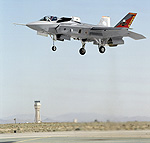Lockheed Martin F-35B Begins In-Flight STOVL Operations
 NAVAL AIR STATION PATUXENT RIVER, Md., January 7th, 2010 -- The Lockheed Martin [NYSE: LMT] F-35B Lightning II short takeoff/vertical landing (STOVL) stealth fighter engaged its STOVL propulsion system in flight for the first time today. The successful test is the first in a series of planned STOVL-mode flights that will include short takeoffs, hovers and vertical landings.
NAVAL AIR STATION PATUXENT RIVER, Md., January 7th, 2010 -- The Lockheed Martin [NYSE: LMT] F-35B Lightning II short takeoff/vertical landing (STOVL) stealth fighter engaged its STOVL propulsion system in flight for the first time today. The successful test is the first in a series of planned STOVL-mode flights that will include short takeoffs, hovers and vertical landings.
"The joint F-35 industry and government team has already shown during extended ground tests that the STOVL propulsion system performs well, and thousands of hours of component testing has validated its durability. Now we are seeing early proof that the system operates in flight as our team predicted," said Dan Crowley, Lockheed Martin executive vice president and F-35 program general manager.
The aircraft is powered by a single Pratt & Whitney F135 engine driving a Rolls-Royce LiftFan®. The system, which includes a Rolls-Royce 3-bearing swivel duct that vectors engine thrust and under-wing roll ducts that provide lateral stability, produces more than 41,000 pounds of vertical thrust. The F135 is the most powerful engine ever flown in a fighter aircraft.
F-35 Lead STOVL Pilot Graham Tomlinson of BAE Systems took off at 1:53 p.m. EST, climbed to 5,000 feet and engaged the shaft-driven LiftFan propulsion system at 210 knots (288 mph), then slowed to 180 knots (207 mph) with the system engaged before accelerating to 210 knots and converting back to conventional-flight mode. The STOVL propulsion system was engaged for a total of 14 minutes during the flight. Tomlinson landed at 2:41 p.m. EST.
STOVL-mode flights will continue, with the aircraft flying progressively slower, hovering, and ultimately landing vertically. Most STOVL-mode testing will be conducted at NAS Patuxent River.
The F-35B will replace U.S. Marine Corps AV-8B STOVL fighters, F/A-18 strike fighters and EA-6B electronic attack aircraft. The United Kingdom’s Royal Air Force and Royal Navy, as well as the Italian Air Force and Navy, also will employ the F-35B. With its short takeoff and vertical landing capabilities, the F-35B will enable allied forces to conduct operations from small ships and unprepared fields, enabling expeditionary operations around the globe.
The Lockheed Martin F-35 is a 5th generation fighter, uniquely characterized by advanced stealth with supersonic speed and high agility, sensor fusion, network-enabled capabilities and advanced sustainment. The three F-35 variants are derived from a common design, are being developed together and will use the same sustainment infrastructure worldwide, bringing economies of commonality and scale. The United States and eight international partners are planning to buy more than 3,000 F-35 aircraft.
Lockheed Martin is developing the F-35 with its principal industrial partners, Northrop Grumman and BAE Systems. Two separate, interchangeable F-35 engines are under development: the Pratt & Whitney F135 and the GE Rolls-Royce Fighter Engine Team F136.